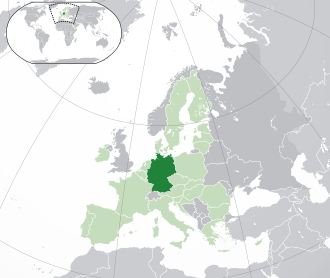Germany





Country in Central Europe
Germany (German: Deutschland ), officially the Federal Republic of Germany (German: Bundesrepublik Deutschland ), is a country in Central Europe. It is bordered by Denmark to the north, Poland and the Czech Republic to the east, Austria and Switzerland to the south, and France, Luxembourg, Belgium, and the Netherlands to the west. Germany is the second most populous country in Europe after Russia, and the most populous member state of the European Union.
History[edit]
The history of Germany is complex and spans over two millennia. The region known as Germany today was inhabited by various Germanic tribes before becoming part of the Holy Roman Empire in the 10th century. The Protestant Reformation, initiated by Martin Luther in 1517, had a profound impact on German society and the wider world. In the 19th century, the German Confederation was established, leading to the unification of Germany in 1871 under Otto von Bismarck. The German Empire was a major player in both World War I and World War II. After its defeat in World War II, Germany was divided into East Germany and West Germany during the Cold War. The country was reunified in 1990 following the fall of the Berlin Wall.
Geography[edit]
Germany is known for its diverse landscapes, which include the Bavarian Alps in the south, the Black Forest in the southwest, and the North German Plain in the north. Major rivers include the Rhine, Danube, and Elbe.
Government and Politics[edit]
Germany is a federal republic consisting of 16 states (Länder). The political system is based on the Basic Law (Grundgesetz), which serves as the constitution. The President of Germany is the head of state, while the Chancellor of Germany is the head of government.
Economy[edit]
Germany has the largest economy in Europe and the fourth-largest in the world by nominal GDP. It is a global leader in several industrial and technological sectors, including automobiles, engineering, and chemicals. Major German companies include Volkswagen Group, Siemens, and BASF.
Culture[edit]
Germany has a rich cultural heritage, with contributions to philosophy, literature, music, and science. Notable figures include Johann Wolfgang von Goethe, Ludwig van Beethoven, and Albert Einstein. The country is also known for its traditional festivals such as Oktoberfest and its cuisine, which includes dishes like sauerkraut and bratwurst.
Education[edit]
Germany has a well-developed education system, with a strong emphasis on vocational training and higher education. The country is home to some of the world's oldest and most prestigious universities, such as the University of Heidelberg and the University of Munich.
Demographics[edit]
Germany has a population of over 83 million people. The majority of the population speaks German as their first language. The country has a diverse population, with significant communities of Turkish, Italian, and Polish descent.
See also[edit]
References[edit]
<references group="" responsive="1"></references>
| Countries and dependencies of Europe | ||||||||||||||||||||||
|---|---|---|---|---|---|---|---|---|---|---|---|---|---|---|---|---|---|---|---|---|---|---|
|
Tinzaparin sodium,

Tinzaparin sodium is a low molecular weight heparin (LMWH) used as an anticoagulant to prevent and treat deep vein thrombosis (DVT) and pulmonary embolism (PE). It is also used in the treatment of acute coronary syndromes (ACS) and for the prevention of clotting in the extracorporeal circuit during hemodialysis.
Ad. Transform your life with W8MD's Budget GLP-1 injections from $75


W8MD offers a medical weight loss program to lose weight in Philadelphia. Our physician-supervised medical weight loss provides:
- Weight loss injections in NYC (generic and brand names):
- Zepbound / Mounjaro, Wegovy / Ozempic, Saxenda
- Most insurances accepted or discounted self-pay rates. We will obtain insurance prior authorizations if needed.
- Generic GLP1 weight loss injections from $75 for the starting dose.
- Also offer prescription weight loss medications including Phentermine, Qsymia, Diethylpropion, Contrave etc.
NYC weight loss doctor appointmentsNYC weight loss doctor appointments
Start your NYC weight loss journey today at our NYC medical weight loss and Philadelphia medical weight loss clinics.
- Call 718-946-5500 to lose weight in NYC or for medical weight loss in Philadelphia 215-676-2334.
- Tags:NYC medical weight loss, Philadelphia lose weight Zepbound NYC, Budget GLP1 weight loss injections, Wegovy Philadelphia, Wegovy NYC, Philadelphia medical weight loss, Brookly weight loss and Wegovy NYC
|
WikiMD's Wellness Encyclopedia |
| Let Food Be Thy Medicine Medicine Thy Food - Hippocrates |
Medical Disclaimer: WikiMD is not a substitute for professional medical advice. The information on WikiMD is provided as an information resource only, may be incorrect, outdated or misleading, and is not to be used or relied on for any diagnostic or treatment purposes. Please consult your health care provider before making any healthcare decisions or for guidance about a specific medical condition. WikiMD expressly disclaims responsibility, and shall have no liability, for any damages, loss, injury, or liability whatsoever suffered as a result of your reliance on the information contained in this site. By visiting this site you agree to the foregoing terms and conditions, which may from time to time be changed or supplemented by WikiMD. If you do not agree to the foregoing terms and conditions, you should not enter or use this site. See full disclaimer.
Credits:Most images are courtesy of Wikimedia commons, and templates, categories Wikipedia, licensed under CC BY SA or similar.
Translate this page: - East Asian
中文,
日本,
한국어,
South Asian
हिन्दी,
தமிழ்,
తెలుగు,
Urdu,
ಕನ್ನಡ,
Southeast Asian
Indonesian,
Vietnamese,
Thai,
မြန်မာဘာသာ,
বাংলা
European
español,
Deutsch,
français,
Greek,
português do Brasil,
polski,
română,
русский,
Nederlands,
norsk,
svenska,
suomi,
Italian
Middle Eastern & African
عربى,
Turkish,
Persian,
Hebrew,
Afrikaans,
isiZulu,
Kiswahili,
Other
Bulgarian,
Hungarian,
Czech,
Swedish,
മലയാളം,
मराठी,
ਪੰਜਾਬੀ,
ગુજરાતી,
Portuguese,
Ukrainian